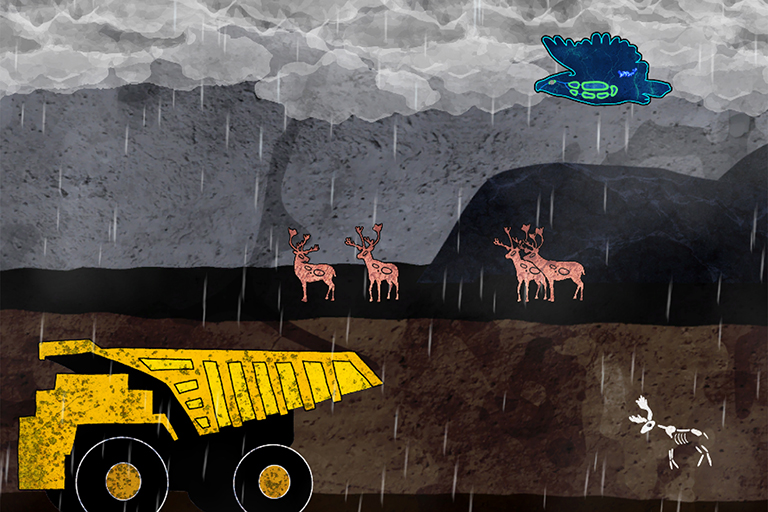These days, videogames do a lot more than provide entertainment. Game designers and developers are finding new ways to incorporate education and awareness into their work, and some are even winning awards for it.
Assistant Professor Elizabeth LaPensée was recently awarded Best Digital Media Work for her latest game at the imagineNATIVE Film + Media Arts Festival, the world’s leading Indigenous media arts festival.
“Receiving this award is meaningful on so many levels, but mainly I am excited to bring attention to Thunderbird Strike and issues regarding pipelines,” said LaPensée.
Inside the Game
Thunderbird Strike is a side-scrolling game in which players can control a thunderbird, a figure in several Indigenous cultures, that uses lightning to revive animals and face off against a snake that threatens to swallow the lands and waters whole.
“I designed Thunderbird Strike to be a high-score game where players can strike lightning at oil infrastructure as well as activate animals and people back to life,” said LaPenée. “My greatest hope is to pass on stories of thunderbirds from my community.”
LaPensée has a joint appointment with ComArtSci’s Department of Media and Information and the College of Arts and Letters. Passionate about the intersections of media, culture and healing, LaPensée is eager to help students find ways to make a difference through their own game design and development.
“I’m glad to have the opportunity to teach Introduction to Serious Games, which focuses on games of all forms with an emphasis on awareness, education and action,” said LaPensée. “The Serious Games Certificate is a great pathway for master’s students interested in understanding how to use games for particular purposes or to develop games of their own.”
Ruffling Feathers
The game also stirred some unexpected controversy. A grassroots group associated with oil interests released a statement claiming that the game promoted eco-terrorism. The story was picked up by news media across the country, though the erroneous facts within it were corrected slowly. The work did not, for instance, receive taxpayer funding from MSU or federal agencies.
Contrary to misperceptions, Dr. Johannes M. Bauer, chairperson of the Department of Media and Information, said that the game is educational, artistic and has no intention to encourage any violence. It is a creative work of art that addresses some of the important issues of our time.
“Dr. LaPensée is a fantastic artist, writer and game designer,” said Bauer. “Thunderbird Strike links indigenous stories and symbols to current issues of public importance. Robust democracy and dealing with controversial matters is contingent on the freedom of expression and of the arts. We are pleased to have [LaPensée] on our faculty.”
Thunderbird Strike was created with design, art and writing by LaPensée; music and sound effects by NÀHGĄ a.k.a. Casey Koyczan; and programming by Adrian Cheater and Aubrey Jane Scott. It was developed thanks to the Arrowhead Regional Arts Council through residencies including O k'inādās Residency, The Banff Musicians in Residence Program and Territ-Aur(i)al Imprints Exchange.
By Kaitlin Dudlets
